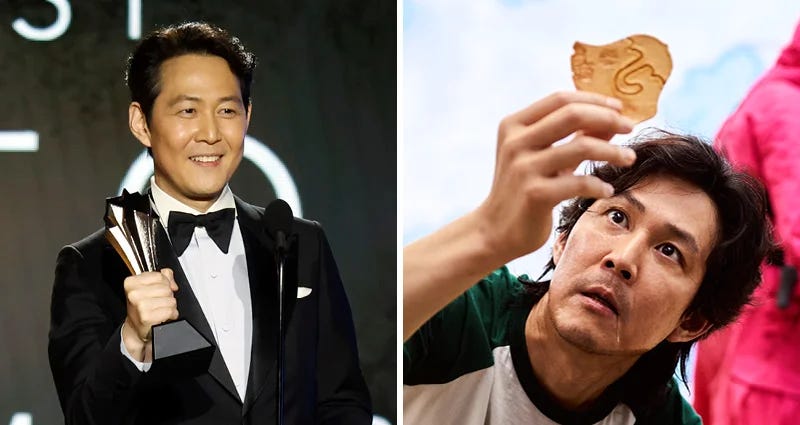‘Squid Game’ lead Lee Jung-jae becomes the first Asian actor to win Best Actor Critics’ Choice Award
'Turning Red' is a turning point for Asians in film. Why is it seen as unrelatable?
“Almost half of all Asian roles serve as a punchline, study finds.”
You’re not the only ones disappointed by that headline. For us, “crushing the myth” means dismantling stereotypes and improving Asian representation across all industries, including Media & Entertainment. Because to truly “see” our community is to see us on screen.
So welcome to Entertainment Exclusive, Crushing the Myth’s new weekly newsletter that breaks down the latest Asian Entertainment news & newsmakers.
Get ready for new shows to binge, videos to keep you on the edge of your seat, and Asian celebs to stan. If that’s not enough, there are also job listings for the entertainment industry & open casting calls just a scroll down.
*Note: Our full weekly “Entertainment Exclusive” newsletter is available for paid subscribers only — subscribe below. But our separate weekly general headlines newsletter will be free.*
🏆 The Headlines
‘Squid Game’ lead Lee Jung-jae becomes the first Asian actor to win Best Actor Critics’ Choice Award — In his acceptance speech, Lee stated. “I cannot express how wonderful I am of… thank you, Netflix. His error was met with gentle laughter from the audience, who may have understood Lee had intended to say “grateful” rather than “wonderful.”
“Thank you, God,” Lee said after accepting the award onstage. “Thank you very much, Critics’ Choice Awards and everyone who loved and supported ‘Squid Game.’”
Fellow “Squid Game” actors Jung Ho-yeon and Park Hae-soo, both also present at the ceremony, were seen cheering enthusiastically from their table. While Jung clapped, Park held up his phone to record Lee’s speech.
The South Korean Netflix original became the most-watched Netflix show of all time with 111 million accounts having streamed the series in the first month of its release.
'Turning Red' is a turning point for Asians in film. Why is it seen as unrelatable? — The film, directed by Domee Shi, tells the story of Meilin (played by Rosalie Chiang), a Chinese Canadian 13-year-old, battling the ups and downs of the early 2000's with her friends, trying to please her mom (played by Sandra Oh) and crushing on her favorite boy band.
The coming-of-age story also breaks some barriers in the industry; Shi is Pixar's first solo female director, and it's the first Asian-led film by the studio. The film, which premiered Friday on Disney+, been widely hailed as a refreshing, creative look at tweendom and the awkwardness of growing up.
But one review posted online earlier this week sparked outcry.
CinemaBlend's managing director Sean O'Connell wrote that he couldn't connect with the film, calling it "limiting."
"By rooting 'Turning Red' very specifically in the Asian community of Toronto, the film legitimately feels like it was made for Domee Shi's friends and immediate family members. Which is fine — but also, a tad limiting in its scope," O'Connell wrote. In a since-deleted tweet, he also called the movie "exhausting."
For many in the Asian community, O'Connell's review felt all too familiar, and still deeply frustrating. Nancy Wang Yuen, a sociology professor at Biola University and author of "Reel Inequality: Hollywood Actors and Racism," said the review didn't match up with her perception of the film at all.
"She's just this average 13-year-old girl who has this puberty issue, so I think it's funny right? Because it's actually probably the more relatable representation of Asians, the most humanized version," Wang Yuen said.
For O'Connell to say that the film was made for a narrow group of people, it's "the centering of whiteness," Wang Yuen said.
See below for more entertainment headlines, casting calls, and entertainment-related job opportunities from Hulu, Google and more ⬇️
Keep reading with a 7-day free trial
Subscribe to Crushing The Myth to keep reading this post and get 7 days of free access to the full post archives.



